Environmental Management System
Environmental Policy
Coway promotes 'healthy environment, happy people' as the core value of its environmental management, and strives to minimize negative environmental impacts of business activities and the overall value chain through environmentally friendly products and services. In 2006, Coway announced its commitment to environmental management through its Environment Management Declaration. Coway announced its environmental management policy in 2012 to ensure regulatory compliance and stakeholder trust; and in May 2024, advanced management standards were set up through the establishment of the Environment Policy. Our environmental management policy applies to all regions where we conduct business, and we recommend that our subsidiaries and business partners also implement the policy.
Environmental Management Policy
Coway's environmental management policy corresponds to the basic principles that must be observed throughout the entire business process, and is further used as a strategic indicator to fulfill social responsibilities.
Coway Environmental Management Basic Principles (Policy)
Coway, the Best Life Solution Company, has established this environmental policy to continuously improve environmental performance through environmentally friendly management while minimizing negative environmental impacts across business activities and the value chain.
This Environmental Policy will be applied in the following ways as a guide to establish environmental policies and a cooperation system for Coway's subsidiaries and business partners:
-
1.
Coway shall strengthen its sustainability and become the global leader among eco-friendly companies by continuously investing in eco-friendly business and innovating itself.
-
2.
Coway shall comply with environmental laws and establish an advanced environmental management system to continuously create value through environmental management, and prepare future growth engines.
-
3.
By establishing a clean production system and complying with precautionary principles such as activities to reduce environmental pollutants and greenhouse gas emissions, Coway shall minimize environmental impact and provide a pleasant environment for future generations.
-
4.
Coway shall lead the development of eco-friendly products, services and technologies by applying lifecycle thinking (“LCT”) to products and services.
-
5.
Coway shall strive to satisfy all stakeholders to the greatest possible extent by transparently disclosing information.
May 2024
Seo Jang-won, CEO of Coway Co., Ltd.
Environmental Management Organization System
Coway's highest decision-making body for environmental management is the Board of Directors (BOD). The ESG Committee operates within the BOD, and the ESG Committee is responsible for regularly reviewing and prior deliberation on major issues related to overall sustainable management, including environmental management. In 2023, internal carbon-price determination and REC processing measures were approved to adapt to 2050 Net-Zero. The Environment and Safety Certification Team is a dedicated organization for Coway's company-wide environmental management, and is responsible for establishing greenhouse gas reduction strategies, measuring and analyzing environmental data, and establishing internal and external ESG environmental infrastructure. In addition, we manage company-wide environmental management performance and report semi-annually on various strategies and tasks for improvement to the BOD. At this time, persons-in-charge from related departments related to the company-wide environment also participate in order to inspect and discuss the implementation of these matters.
Environmental-Management Reporting System
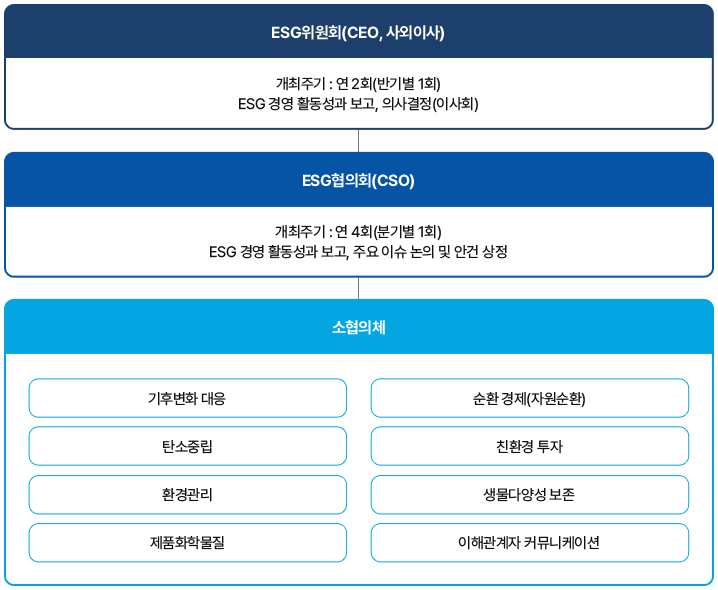
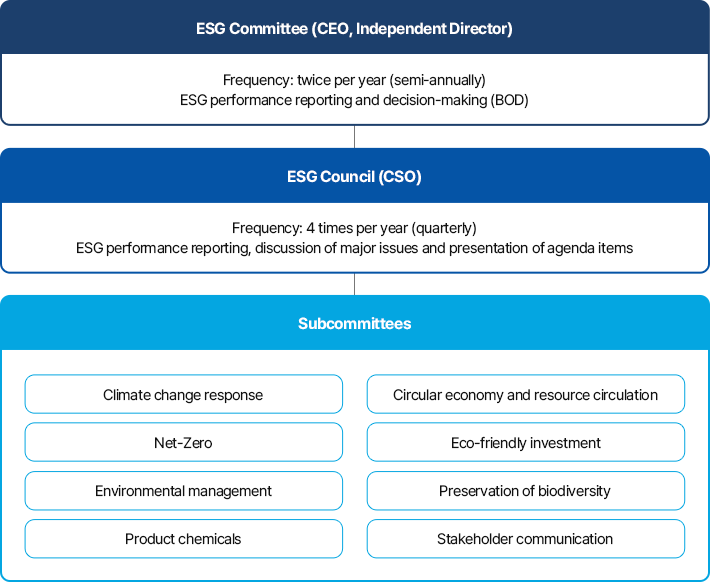
Environmental Management Strategy
Coway has established an environmental management strategy to continuously provide environmentally friendly products and services and minimize the environmental impact of business activities. With the goal of achieving Net-Zero by 2050 through the gradual promotion of RE100, we are pursuing 'maximizing environmental brand value, environmental impact management, resource circulation, communication and participation' as major tasks. Based on this goal, Coway is internalizing the environmental management system by 2030 and managing it by designating it as a key performance indicator (KPI) for related departments.
Environmental Management Environmental Management Key Performance Indicators (KPI)
Targets: CTO (headquarters) and subs (offices), product planning department, design lab (headquarters)
Size: Differentiated evaluation depending on the performance compared to the goals set by each organization
| Organization | Key Performance Indicators (KPIs) |
|---|---|
| CTO (Headquarters) | Identifying and promoting ESG strategic tasks (focusing on proactive regulatory responses) |
| Sub (Offices) | Planning and development of products using eco-friendly and recycled resin |
Environmental Management Strategy System
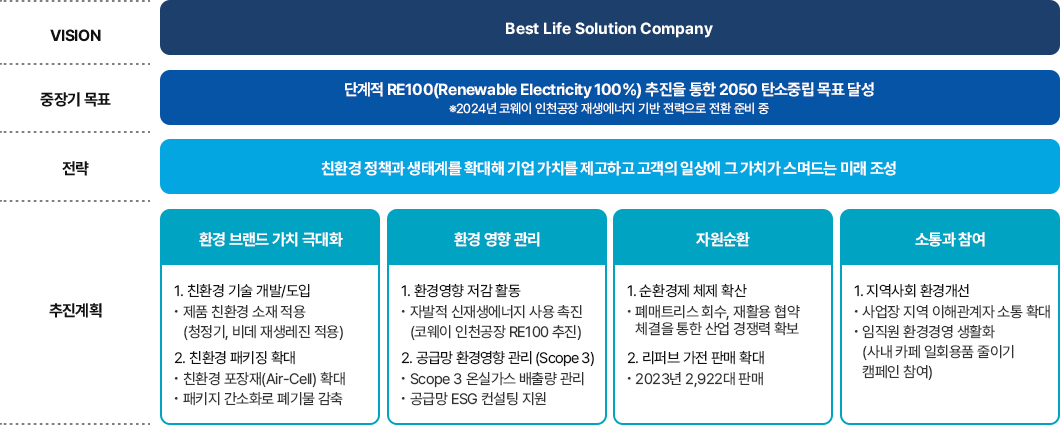
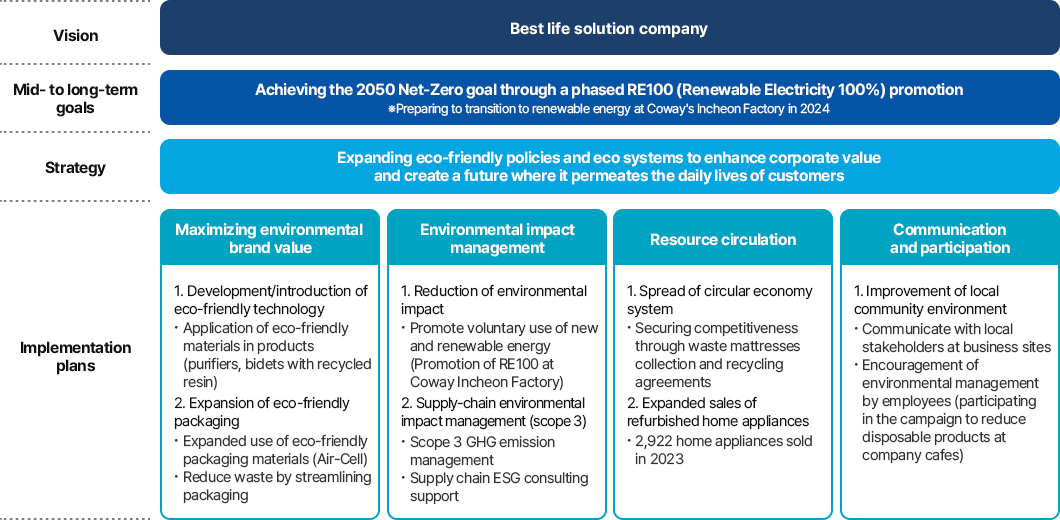
Environmental Management System Certification
Coway has established an environmental management system that meets global standards by obtaining ISO14001 certification for all of its domestic business sites, and its environmental management performance is verified and certified through annual follow-up reviews and renewal reviews every three years. Through this, we are efficiently managing environmental risks by systematically identifying, evaluating, managing, and improving environmental aspects of all business activities.
ISO Operation Process


ISO14001 Certifications by Site
| Certified sites | Certification period | Certifications |
|---|---|---|
| Seoul Office |
June 24, 2023 to June 23, 2026 Renewal review: 3 years / Follow-up review: 1 year |
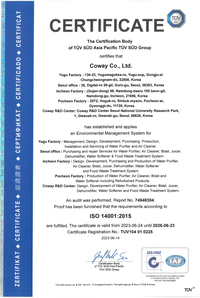
|
| Yugu Factory | ||
| Incheon Factory | ||
| Pocheon Factory | ||
| Environmental Technology Research Institute (R&D center) |
Strengthening Environmental Management Capabilities
Environmental Training for Employees
Coway provides information and training necessary for environmental management activities to employees, thereby raising their awareness of environmental management and strengthening their capabilities. In 2023, various training courses related to climate change, ESG management, and environmentally hazardous substances were completed, and Coway plans to continue to expand environmental competency training ― not only for its employees but also for its partners.
| Category | Training program | Number of participants | Training hours |
|---|---|---|---|
| Climate change | Climate change (TCFD) operation | 3 | 40 hours (13.3 hours per person) |
| ESG sustainability report filing | |||
| Workshop for young environmental researchers | |||
| ESG management | ESG environmental management | 10 | 52 hours (5.2 hours per person) |
| Environmentally hazardous substances | Coway‘s Chemical Management Standards and Policies | 22 | 154 hours (7 hours per person) |
| Hazardous chemical substance quality management | |||
| Global environmental regulations course |
Environment Policy Management System
Coway performs its work in accordance with procedures to respond to global regulations related to product environments. We have established monitoring standards and processes for monitoring regulatory information, which is the most basic and important starting point for responding to regulations, and are currently establishing/operating an Environmental Regulation Information Management System (ERIMS) for digital management. Through ERIMS, we check the regulatory status by product group/regulation/country and promote product development to continuously manage regulatory risks. Coway complies with domestic and international environmental regulations as follows:
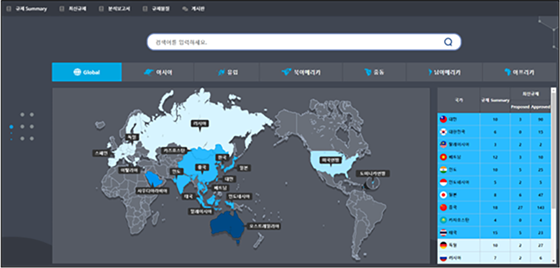
ERIMS, a regulatory information management system to respond to domestic and international environmental regulations
- 01Electrical appliances and consumer products safety control act
- 02Act on resource circulation of electrical and electronic equipment and vehicles
- 03Act on promotion of saving and recycling of resources
- 04Drinking water management method (limited to water purifiers)
- 05Response to other domestic laws and similar laws and regulations overseas (major export countries)
Environmental Regulation Adaptation Procedures
Regulatory information monitoring
Establishment of adaptation strategies by country/regulation
Development/ improvement of products and components
Conformity verification
Monitoring and follow-up management
Eco-friendly Investment
As the demand for Net-Zero spreads globally, Coway has been installing and operating solar power plants as part of its ESG investment. Coway's solar power plants are installed at Yugu Factory (49.5 kWh scale), Incheon Factory (39 kWh scale), Pocheon Factory (45 kWh scale), and Yugu Logistics Center (1,048.8 kWh scale) by using the rooftop of the company's business sites to utilize unused building sites In March 2023, a solar power plant with a capacity of 802.35 kWh was installed on the roof of the subsidiary BEREX Tech building, and the expected annual power generation is 966 MWh, which generates enough power for approximately 270 households per year.

